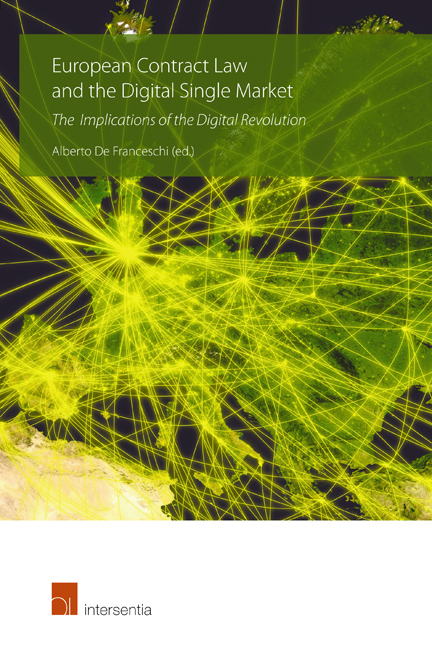Book contents
- Frontmatter
- Preface
- Contents
- List of Authors
- European Contract Law and the Digital Single Market: Current Issues and New Perspectives
- PART I THE IMPACT OF DIGITAL TECHNOLOGY ON PRIVATE LAW RELATIONSHIPS
- PART II DATA AS A TRADEABLE COMMODITY AND THE NEW INSTRUMENTS FOR THEIR PROTECTION
- Data as a Tradeable Commodity
- Jurisdiction regarding Claims for the Infringement of Privacy Rights under the General Data Protection Regulation
- PART III THE LEGISLATIVE INSTRUMENTS FOR A DIGITAL SINGLE MARKET
- PART IV NEW FEATURES OF STANDARD CONTRACTS IN THE DIGITAL MARKET
- PART V ONLINE PLATFORMS IN THE ‘SHARING ECONOMY’
Jurisdiction regarding Claims for the Infringement of Privacy Rights under the General Data Protection Regulation
from PART II - DATA AS A TRADEABLE COMMODITY AND THE NEW INSTRUMENTS FOR THEIR PROTECTION
Published online by Cambridge University Press: 12 December 2017
- Frontmatter
- Preface
- Contents
- List of Authors
- European Contract Law and the Digital Single Market: Current Issues and New Perspectives
- PART I THE IMPACT OF DIGITAL TECHNOLOGY ON PRIVATE LAW RELATIONSHIPS
- PART II DATA AS A TRADEABLE COMMODITY AND THE NEW INSTRUMENTS FOR THEIR PROTECTION
- Data as a Tradeable Commodity
- Jurisdiction regarding Claims for the Infringement of Privacy Rights under the General Data Protection Regulation
- PART III THE LEGISLATIVE INSTRUMENTS FOR A DIGITAL SINGLE MARKET
- PART IV NEW FEATURES OF STANDARD CONTRACTS IN THE DIGITAL MARKET
- PART V ONLINE PLATFORMS IN THE ‘SHARING ECONOMY’
Summary
INTRODUCTORY REMARKS
DATA PROTECTION AND THE LAW OF CONTRACTS
Personal data are often collected upon the conclusion of a contract or in connection with the performance of the obligations arising thereunder. One party may need information regarding the other as a means to assess the legal implications of an envisaged contract, or to discharge its obligations towards the latter once the contract is concluded. Information collected in the context of a contract may equally serve purposes unrelated to the particular transaction in question, such as making predictions as to the behaviour of a group of market actors, based on the aggregation, mining and cleansing of personal data (profiling).
As a matter of EU law, issues relating to data protection fall outside the law of contracts. The liability arising from the unlawful collection or processing of personal information does not become contractual in nature just because the infringement occurred in the course of pre-contractual dealings or in relation to the fulfilment of a contractual promise. Different views have been expressed by scholars as to the distinction between contractual and non-contractual liability within the legal order of the EU. The Court of Justice, however, has made clear that when a person claims the liability of another, the mere fact that the two persons are bound by a contract is not sufficient to characterise the claim as a claim in contract. A contractual characterisation, the Court noted, can in fact be retained ‘only where the conduct complained of may be considered a breach of contract, which may be established by taking into account the purpose of the contract’, as is notably the case ‘where the interpretation of the contract [linking one party to the other] is indispensable to establish the lawful or, on the contrary, unlawful nature’ of the conduct at stake. The finding, it is submitted, applies irrespective of whether the contract against the background of which the infringement occurred is a business-to-business contract or a consumer contract. Actually, as the Court stated with respect to jurisdiction over crossborder consumer disputes, the EU rules aimed at the protection of consumers’ rights only apply to such claims as ‘relate to a contract which has been concluded between a consumer and a professional’.
- Type
- Chapter
- Information
- European Contract Law and the Digital Single MarketThe Implications of the Digital Revolution, pp. 81 - 108Publisher: IntersentiaPrint publication year: 2016
- 1
- Cited by

